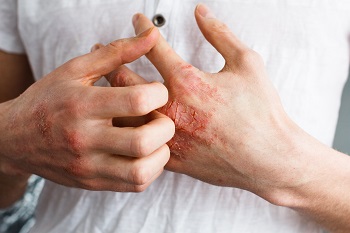

With eczema, there is inflammation (increased number of white blood cells) in the skin. The inflammation is similar to the way the body reacts to parasitic infections. In the case of parasitic infections such as scabies and lice, itching is also a dominant problem. Then it is appropriate to scratch, since it means that we get the parasites removed from the skin. In atopic eczema, there is a kind of miscommunication in the immune system, so that there is an inflammation with itching without any parasites in the skin. The result is even more eczema from all the chlorine and irritation in the skin.
The causes of eczema are that the skin barrier functions less well and that the immune system is activated. Children and adults with atopic eczema may have a congenital skin type that predisposes to eczema. This is a skin type that can be sensitive to everything from soap, water, wool, stress and food to sweating and weather changes.

Children and adults with atopic eczema have itchy, red skin that flakes. In the first years of life, the itchy rash is often on the face and on the stretched sides of the arms and hands. From the age of two, the rash appears in the elbow flexors and knees. In young people and adults, there is also eczema in the elbow flexors and knees, in addition to the hands, neck and eyelids. People with atopic eczema have a higher incidence of pollen allergy and asthma, but despite this, it is rare to find an allergic cause for the eczema and itching.
Heredity plays a major role in the cause of atopic eczema. Nevertheless, there has been an increase in the incidence in recent decades. This means that there must be something in the environment that causes predisposed people to develop eczema. The researchers therefore believe that a hygienic lifestyle with few infections, little contact with animals and a lot of washing with soap, may be factors that play a role. The exact cause of atopic eczema is currently not known. Unfortunately, there is no simple test that can determine whether a person has atopic eczema, or a test that can say something about how long the disease will persist.
The main symptom of atopic eczema is intense itching. Treatment of itching is difficult. Allergy tablets can be tried, but usually have little effect. Eczema is therefore treated by strengthening the skin's barrier with proper skin care and the use of moisturiser, and by reducing the inflammation in the skin. Inflammation of the skin can be treated by using the right cortisone creams, and on rare occasions tablets or injection treatment may also be appropriate.